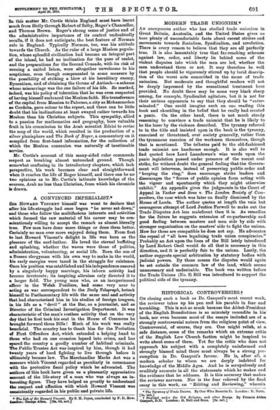MODERN TRADE UNIONISM.*
AN anonymous author who has studied trade unionism in Great Britain, Australia, and the United States gives us here plenty of uncomfortable facts about recent strikes and movements towards Socialism, Syndicalism, and revolution. There is every reason to believe that they are all perfectly true. It is also lamentably true that far-reaching schemes against law, order, and liberty lie behind some of the violent disputes into which the men are led, whether the men understand them or not. It may therefore be well that people should be vigorously stirred up by lurid descrip- tion of the worst acts committed in the name of trade unionism. But moderate and thoughtful readers will not be deeply impressed by the sensational treatment here provided. No doubt there may be some very black sheep among, for example, Syndicalist agitators, but it is not for their serious opponents to say that they should be "exter- minated." One could imagine such an one reading this book and chuckling in the belief that lie really had created a panic. On the other hand, there is not much steady reasoning to convince a trade unionist that he is likely to be the loser by the violence described. The tyranny referred to in the title and insisted upon in the book is the tyranny, exercised or threatened, over society generally, rather than the tyrannous coercion of the workmen themselves, though that is mentioned. The tributes paid to the old-fashioned trade unionist are handsome enough. It is also well to find quoted here Lord Lansdowne's wise words upon the panic legislation passed under pressure of the recent coal strike, for without doubt the general feeling that the Govern- ment will intervene, instead of preserving public order and "keeping the ring," does encourage strike leaders and discourages the "forces of public opinion from acting with the vigour and spontaneity which they might otherwise exhibit." An appendix gives the judgments in the Court of Appeal in Vacher and Sons v. The London Society of Com- positors, the case which was later on finally dismissed by the House of Lords. The author quotes at length the vain but courageous attempt of Lord Justice Farwell to make out the Trade Disputes Act less maleficent than it is. As remedies for the future he suggests extension of co-partnership and good feeling between masters and men side by side with stronger organization on the masters' side to fight the unions. How far these are compatible he does not say. He advocates the repeal of "all laws legalizing trade union conspiracies." Probably an Act upon the lines of the Bill Lately introduced by Lord Robert Cecil would do all that is necessary in this direction, and it is perfectly fair to the unions. Lastly, the author suggests special arbitration by statutory bodies with judicial powers. By these means the disputes would again be set outside the common law of the land, -which seems unnecessary and undesirable. The book was written before the Trade Unions (No. 2) Bill was introduced to support the political side of the tyranny.


























































 Previous page
Previous page